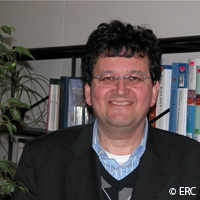Karlsruhe's Puchta awarded ERC grant
One of the biggest gripes consumers have about the fruits and vegetables they eat is that they often taste like cardboard. And while it's easy to blame farmers for using pesticides to kill the varmints that invade our foods, farmers claim they use them to ensure good quality and safe foods. Thankfully, several researchers in Europe are working to provide consumers with foods that taste just like they should taste. Professor Holger Puchta from the Karlsruhe Institute of Technology (KIT) in Germany is one such researcher, and the European Research Council (ERC) has awarded him an Advanced Research Grant worth EUR 2.5 million for his latest endeavour. Professor Puchta is working on developing new techniques that will enable him to control inheritance in plants to selectively improve the properties of various species through the gene pool found in nature. For instance, he is targeting foods that are hardier and can resist both pests and extreme weather without compromising on flavour. 'Plant breeding, i.e. interbreeding of plants with the aim of achieving improved agronomic properties, has been practised since the beginning of civilisation,' explains Professor Puchta, who is the chair at KIT's Botanical Institute. Until now, researchers have had trouble generating positive results because it's been more about trial and error and random chance. This is where Professor Puchta and his team enter the picture. They will use their new techniques to effectively control and influence genetic exchange (meiosis) selectively. 'We want to turn the arbitrary process into a controlled process of inheritance to finally be able to determine in advance the properties we will be transferring,' Professor Puchta says. The myriad organisms found in nature are responsible for providing the huge gene pool known to mankind. 'To optimally use that pool for nutrition of humans, we must learn how to transfer properties such as resistances to diseases and pests from wild to cultivated plants,' he goes on to say, highlighting that this would, for example, provide new possibilities for breeding crops. 'Since large parts of the genome, or genetic information, of crops are not exchanged during inheritance, it is quite difficult to introduce new properties into the cultivated species.' The researchers are using the common wall cress (Arabidopsis) as the model plant. 'The products we obtain have nothing to do with the classic genetically modified organisms (GMO),' Professor Puchta points out, adding that the preconditions for the study are ideal. 'During the recent years, techniques for genome sequencing have been enhanced enormously.' For example, the researcher will make use of artificial DNA (deoxyribonucleic acid) scissors in their work; DNA scissors allow researchers to cut and recombine genetic information in the parent stock. Ultimately, the KIT researchers will use our natural resources to give cultivated plants they boost they need. According to Professor Puchta, various approaches will be used to help him manipulate the model plant's inheritance. He expects positive results within the next five years. 'As a matter of fact, I feel quite confident that, by then, we will have found first solutions to controlling inheritance in cultivated plants such as the tomato,' Professor Puchta says. Advanced Researcher Grants are awarded to pioneering researchers who are generating positive research results in their fields of study. Professor Puchta, for his, part, has been working on DNA recombination for over 20 years.For more information, please visit: Karlsruhe Institute of Technology (KIT):http://www.kit.edu/english/European Research Council (ERC):http://erc.europa.eu/
Countries
Germany



